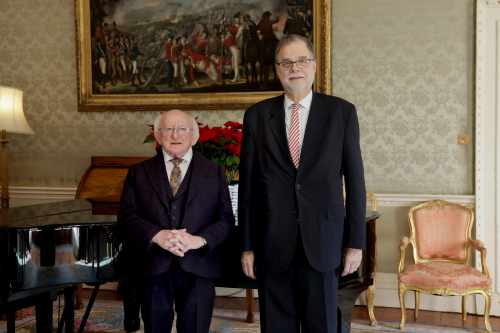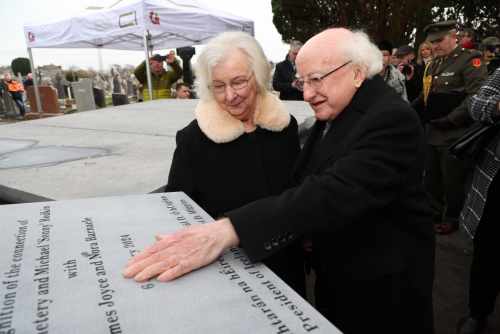Speech by President Higgins at Young Scientist & Technology Exhibition 2024
RDS, 10 January 2024
A cháirde,
Is mian liom gach dea-ghuí agus gach rath a bhronadh ar na mic léinn go léir atá ag tógáil pairt i dTaispeántas an Eolaí Óg agus Teicneolaíochta na bliana seo. Traoslaím libh go léir.
[I would like to offer my best wishes and good fortune to all of the students participating in this year’s Young Scientist and Technology Exhibition. Congratulations to you all.]
Since the first Young Scientist competition, almost 60 years ago in 1965, hundreds of thousands of science students have demonstrated their skills, talents and ingenuity. This year 2,042 projects have been submitted from 343 schools in 30 counties from across the island of Ireland, from which 550 projects were selected to compete here in the RDS. Congratulations to all who have made it to the competition.
The projects that are exhibited this year cover issues in important areas such as health and wellbeing, artificial intelligence, diversity and inclusion, climate change and ecology, offering a range of new and adapted technologies.
As I reflect on the exhibits here today and on their connection with the issues and challenges we face together in relation to our shared, vulnerable planet, may I suggest that there has never been a better time in which to be a young scientist.
Yes, it is a challenging time of interacting crises in ecological, social and economic terms, but it is so potentially fulfilling to know that the choices you make will have effects that are important, not just for your own time but for the very possibility of life itself in its diverse forms. Indeed your work can affect the very possibility of all of us having a future on our vulnerable planet.
This year we cannot ignore the fact that so many of the most advanced developments in science and technology are being used as tools of war and destruction. A new generation of young scientists has yet to turn science and technology for universal benefit – be it ecological responsibility, food security, universal basic services.
May I suggest that, as a young scientist, you will achieve the greatest impact, deliver the most influential results, when you locate your contribution within a commitment as a concerned and contributing global citizen. The curiosity that is science is, after all, from an instinct grounded in the betterment of society, in sustaining not only humanity’s progress in addressing challenges, but in opening opportunities for a shared fulfilment of life for which good science is critical to the ongoing pursuit of a more just, peaceful, inclusive and sustainable world.
It is very moving to read in the biographies of the greatest scientific minds their depression at seeing science, and its technological instruments and outputs, being employed for the pursuit of war and conflict, of instruments in the service of violence that will not lead to any constructive approach as might achieve the necessary conditions for the co-existence of all in conditions of peace, for which we, all of us, must aspire. These accounts fall way short of reaching the human aspirations involved, fall almost into a category of species failure, capitulation to failure from what is short term and consumable.
Surely the best use of your talents, the location of your gifts, is in a moral context working for the benefit of all humanity.
Let us celebrate the brilliant exceptions which we need so much.
There is perhaps no better example of the positive role which science has played than in its providing scientific evidence of climate change and biodiversity loss, our greatest challenge, an existential one that threatens our future shared existence on this planet, as well as that of every living thing that inhabits it. There are the great achievements in preventing and responding to pandemics.
In taking that responsible role, science has helped to inform a social, economic and political debate on the urgent need to reduce greenhouse gas emissions so that we may remain within the planet’s ecological boundaries and protect the Earth and all the life on it from the catastrophic consequences of global warming and biodiversity loss.
The sociologically focused projects from young scientists and scholars remind us that an economy embedded in ethical purpose offers the best prospects for sustainability and efficiency in the long term.
Several of the projects exhibited here at Young Scientist relate to artificial intelligence, an exciting technological development that carries the potential to be transformative, even emancipatory in, for example, the life-sciences industry by enabling faster and more accurate diagnoses, personalised treatment plans, and drug development, yet it raises, too, a range of ethical considerations that must be addressed. Will it be delivered for the widest public, even universal, benefit? The issues of appropriate regulation and delivery are first-order public and moral choices.
There are many great role models who can serve as great inspiration to young scientists. Nobel Laureate William C. Campbell from Donegal, whose research on river blindness led to the drug Ivermectin which was made available to all by Merck from 1987, leading 30 years later to 3 billion Ivermectin treatments being delivered, river blindness being eliminated in Central and South America, and significantly reduced in Africa.
We can also think of Dublin-born Francis Rynd, a doctor at the Meath Hospital, who developed the first hypodermic syringe, with which he administered the world’s first ever pain-relieving injection in 1844.
Then, too, John Joly of County Offaly was instrumental in developing radiotherapy for the treatment of cancer.
Last year I had the honour of bestowing a Presidential Distinguished Service Award to Professor Teresa Lambe, an Irish scientist working at Oxford University’s Jenner Institute, who co-designed the AstraZeneca vaccine, which is the most widely used vaccine against COVID-19 in the world.
All of these scientists, including perhaps most notably Dr Campbell, fall into that great tradition exemplified by the great Dr Jonas Salk who believed that scientific discovery should benefit all, without borders, state or economic.
After all, surely knowledge is for sharing, and the practice of science and the appropriate delivery of its work through appropriate technology should flow to all unimpeded by boundaries of nations or income. Which type of science in which to engage involves a personal curiosity combined with commitment and capacity. The motivation to deliver on this is inescapably powerful and moral.
As the great Irish scientist Mike Cooley put it:
Science and technology is not given. It was made by people like us. If it’s not doing for us what we want, we have a right and a responsibility to change it.”
I have, in recent speeches, offered the belief that it is in the most populated regions that science offers the most exciting delivery.
It is in relation to Africa that good, moral science can be employed to deliver a transformative agenda. Africa, for example, being the continent of the young, the continent where, by 2030, young Africans are expected to constitute 42 percent of the world’s youth population.
I have been fortunate to have met the winners of the Kenyan Young Scientist Awards. It was an occasion which gave me great hope that practical scientific solutions to the problems facing Africa can be developed and delivered by Africans themselves, drawing on advances and innovations together with their own traditional knowledge and wisdom.
Last year I travelled to Rome for the World Food Forum in October and to Dakar for the Africa Food Summit in January. I spoke in my addresses of the need for the benefits of science to be shared so that we may deliver a resilient, food-secure world.
What a moral outrage it has become, what a great failure, with all the material resources available, given our boundless capacity for creativity and innovation, that the fruits of science and technology remain directed in so many parts of world, not on the ending of global hunger or famine, or the promotion and preservation of peace, or indeed on reducing sources of inequality, but on the pursuit of ever more deadly technologies as instruments of war, and indeed that the results of science and technology are so often abused in the promotion, through irresponsible advertising, of a model of consumption and insatiable accumulation as the most desirable, even inevitable, version of a life of fulfilment.
When scientists combine to work for peace, it carries a valuable authority. There you all become activists for peace. It is important, I repeat, that we acknowledge that the fruits of science have revolutionised life, enabled tremendous social change, with humankind benefitting from scientific advances in so many areas of life. However, we must also recognise the circumstances with which we now struggle, that the misuse of scientific knowledge has been and can be disastrous for us all.
Science is never neutral. Science, as all of you as practitioners need no reminding, can be employed to generate ever more sophisticated weapons and instruments of death and destruction that are used to generate fear and devastation for populations while supporting the insatiable drive of military industrial complexes with little accountability, overwhelming influence and whose principal purpose is the generation of profits, even at the cost of undermining democratic accountability through corruption, unaccountable lobbying, and bribery in continents where millions are starving and societies lack basic conditions for survival.
Young scientists, therefore, have not only great opportunities, but a great responsibility to build and enhance a moral consciousness of the importance of working within an ethical framework, a consciousness that must be central to any scientific endeavour, one that helps guide our use and application of scientific discovery.
As Pope Francis has put it:
The drive toward scientific achievements must always be directed to the needs of fraternity, justice, and peace [in order to] help meet the great challenges facing our human family and our environment.”
Gender equality in terms of opportunities in science is so important. I am delighted to see great advancements in the number of girls and women engaged in science. While it is true that since 2015, when world leaders agreed the Sustainable Development Goals, which emphasise the importance of education, gender equality and inclusive infrastructure, we have seen significant improvements globally from the perspective of STEM participation, a considerable gender gap still exists.
In most countries, while women represent a majority of all graduates from tertiary education, fewer women than men complete STEM university degrees. Less than 30 percent of researchers worldwide are women, and less than a third of all female students globally select STEM-related fields in higher education.
The statistics for Ireland are only slightly more encouraging than these global figures. On a headcount basis, just over 35 percent of all those engaged in STEM research in Ireland are female, compared with over 50 percent in countries such as Argentina, Latvia, New Zealand, Thailand and Venezuela.
Science involves some of the most valuable forms of co-operative work. May I conclude today by asking you to seek, and continue to seek, possibilities for co-operation with each other in your endeavours. It is through the sharing of scientific ideas that we may share the joy of scientific discoveries that co-operation facilitates, even serendipitous discoveries, thus advancing the truly emancipatory potential of science for society and for all of life, ensuring that the fruits of science can contribute solutions to the great global, social, economic and ecological challenges we face on our planet, seek to advance the possibilities of fulfilment for all that are there beyond the narrow provision of a source of wealth for any single individual or corporation.
It is my hope that your participation in Young Scientist will further drive your interest and determination to continue to play a role in science, its application, and to deliver your energy to where it is most necessary for the benefit of all of society.
I wish you all a Happy New Year.
Traoslaím libh uilig, le gach dalta agus scoil atá ag glacadh páirt.
Beir beannacht.


